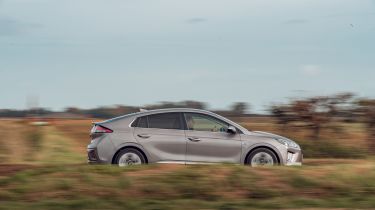Hyundai Ioniq Hybrid (2016-2022) MPG & CO2 emissions
The Hyundai Ioniq Hybrid is very efficient compared to a diesel hatchback, but it's a shame the Toyota Prius manages lower CO2 emissions
| Fuel economy (combined) | Fuel economy (high) | Fuel economy (low) | CO2 emissions |
|---|---|---|---|
| 61-63mpg | 72mpg | 64mpg | 102-105g/km |
Although the Hybrid is the least efficient member of the three-strong Hyundai Ioniq family, it still does well by combustion-engined standards and doesn't require plugging in to charge its battery. It's also the cheapest of the trio, which goes some way towards explaining why it's the best-selling version by a big margin.
Hyundai Ioniq Hybrid MPG
The Ioniq Hybrid’s official figures of 102-105g/km CO2 emissions and 61-63mpg fuel economy shame most diesel rivals and are competitive with those of the 1.8-litre Toyota Corolla, which emits between 101-115g/km of CO2 and returns 55-63mpg. The Hyundai’s real-world economy should be impressive, too; you’ll likely manage over 50mpg with ease.
The Ioniq also has something called ‘ECO-DAS’, or 'Eco Driving Assistant System', which helps keep fuel costs as low as possible by calculating the most efficient navigation route, taking traffic into consideration. It even encourages coasting by giving prior warning of changes in speed limits or road conditions.
CO2 emissions
The Ioniq's CO2 emissions of 102-105g/km are good by diesel-car standards, but the Prius does undercut the Ioniq Hybrid (provided you have the Toyota on 15-inch wheels). Neither gets free access to the London Congestion Charge Zone any more – for that you'll need a pure-electric car.
